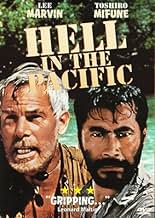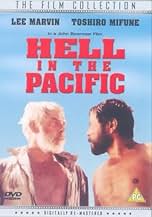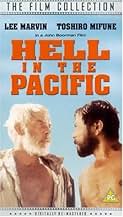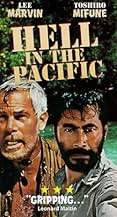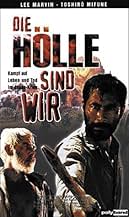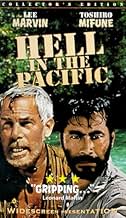NOTE IMDb
7,2/10
9,6 k
MA NOTE
Pendant la Seconde Guerre mondiale, un pilote américain et un capitaine de la marine japonaise abandonnés sont désertés sur une petite île inhabitée de l'océan Pacifique.Pendant la Seconde Guerre mondiale, un pilote américain et un capitaine de la marine japonaise abandonnés sont désertés sur une petite île inhabitée de l'océan Pacifique.Pendant la Seconde Guerre mondiale, un pilote américain et un capitaine de la marine japonaise abandonnés sont désertés sur une petite île inhabitée de l'océan Pacifique.
- Réalisation
- Scénario
- Casting principal
- Récompenses
- 1 victoire et 2 nominations au total
Toshirô Mifune
- Captain Tsuruhiko Kuroda
- (as Toshiro Mifune)
Avis à la une
A Japanese naval officer and an American pilot find themselves stranded alone on a desert island during WWII. How would you react to being marooned with a dangerous enemy? This film is an obscure treasure that should be better known. I suspect that people are put off by the cheesy and unsuitable title. The film explores the evolving relationship of two men from different cultures as they each struggle to find the best way to survive. Their collective fate is an exploration of the human condition.
One outstanding feature of this film is that it is in both Japanese and English, intentionally without sub-titles. An American or Japanese audience could watch this film and appreciate its message. This duality serves to heighten the cultural differences between the two men, and it is cultural bias that is the true enemy.
Buy it, it's a keeper!
One outstanding feature of this film is that it is in both Japanese and English, intentionally without sub-titles. An American or Japanese audience could watch this film and appreciate its message. This duality serves to heighten the cultural differences between the two men, and it is cultural bias that is the true enemy.
Buy it, it's a keeper!
What I would give to know only Japanese and watch this movie. You don't have to understand what Toshiro Mifune is saying to understand this movie.
Does war extend to the individual? Trained to kill or be killed, two adversaries face off. Each with his own fear that the other will succeed. Why didn't they kill each other when they had the chance? Because man is a social animal and he needs the company of others. To use a cliché - No man is an island.
And in the end conflict erupts. Not because of any innate difference between the two men - but because of how they define themselves in a greater scene. I am Japanese - you are American (and vice versa). Throw in the element of non-communication (neither spoke any of the other's language) and you have it.
Two great actors, a great script, a grand theme.
Does war extend to the individual? Trained to kill or be killed, two adversaries face off. Each with his own fear that the other will succeed. Why didn't they kill each other when they had the chance? Because man is a social animal and he needs the company of others. To use a cliché - No man is an island.
And in the end conflict erupts. Not because of any innate difference between the two men - but because of how they define themselves in a greater scene. I am Japanese - you are American (and vice versa). Throw in the element of non-communication (neither spoke any of the other's language) and you have it.
Two great actors, a great script, a grand theme.
In World War II, a shot-down American pilot (Lee Marvin) and the marooned Japanese Captain Tsuruhiko Kuroda (Toshiro Mifune) are stranded in a small island in the Pacific. When they find the presence of each other, the American tries to steal the water provision of the Japanese that protects it, initiating their personal war. After a period fighting each other, they decide to join forces and build a bamboo raft to seek a larger island.
"Hell in the Pacific" is a good movie about how struggle to survive supersedes any other feelings even in times of war. The Japanese and the American soldiers find how pointless is their fight and resolve their situation joining forces and learning to accept and respect their culture differences despite the language barrier and warfare. Surprisingly they also become friends but the abrupt conclusion is too stupid and meaningless, apparently imposed by the studio. The alternate ending is also terrible but better then the original one. In 1985, Wolfgang Petersen used the same idea in a futuristic environment in "Enemy Mine". My vote is seven.
Title (Brazil): "Inferno no Pacífico" ("Hell in the Pacific")
"Hell in the Pacific" is a good movie about how struggle to survive supersedes any other feelings even in times of war. The Japanese and the American soldiers find how pointless is their fight and resolve their situation joining forces and learning to accept and respect their culture differences despite the language barrier and warfare. Surprisingly they also become friends but the abrupt conclusion is too stupid and meaningless, apparently imposed by the studio. The alternate ending is also terrible but better then the original one. In 1985, Wolfgang Petersen used the same idea in a futuristic environment in "Enemy Mine". My vote is seven.
Title (Brazil): "Inferno no Pacífico" ("Hell in the Pacific")
Isolation in extreme conditions allows for very telling studies of human beings, and potentially unpleasant philosophical conclusions. Marooning a character on an island will get you some dramatic results, and the only way to take it a step further is to maroon that character's worst possible enemy with him. That's what Hell in The Pacific proposes.
This is not Cast Away Meets WWII. For one thing, it has a much tighter focus, completely losing anything beyond the island's horizon. It is admirable in its bloody-minded focus, and, with only two actors to cast, it's hard to imagine how it could have been any more perfect that pitching wild-man extraordinaire Lee Marvin opposite Kurosawa favorite Toshiro Mifune. A genius idea, but one that could have failed with a more conventional approach.
We are introduced to both antagonists in a neutral way, free to prefer which ever one we choose, though that is hardly the point, and director John Boorman makes it both easy and at times hard to sympathise with either in equal measure. Both actors do a fine job, playing mostly emotional and physical roles with great restrain and intelligence.
Boorman's direction is perfect, rejecting excess stylization in favor of a subtle approach, aided by superb photography. You have got to see this at least once, simply because, for all its visceral thrills, it is quite profound without ever trying to be. Because it boasts top performances from two of the last century's greatest leading presences in action cinema. Because, though frustrating at first, the ending is, for once, the smartest one that could have been chosen. Humanity is on trial and the judges choose to be honest and pragmatic, thus delivering something that combines greatness and very thoughtful substance.
We need more films like this!
This is not Cast Away Meets WWII. For one thing, it has a much tighter focus, completely losing anything beyond the island's horizon. It is admirable in its bloody-minded focus, and, with only two actors to cast, it's hard to imagine how it could have been any more perfect that pitching wild-man extraordinaire Lee Marvin opposite Kurosawa favorite Toshiro Mifune. A genius idea, but one that could have failed with a more conventional approach.
We are introduced to both antagonists in a neutral way, free to prefer which ever one we choose, though that is hardly the point, and director John Boorman makes it both easy and at times hard to sympathise with either in equal measure. Both actors do a fine job, playing mostly emotional and physical roles with great restrain and intelligence.
Boorman's direction is perfect, rejecting excess stylization in favor of a subtle approach, aided by superb photography. You have got to see this at least once, simply because, for all its visceral thrills, it is quite profound without ever trying to be. Because it boasts top performances from two of the last century's greatest leading presences in action cinema. Because, though frustrating at first, the ending is, for once, the smartest one that could have been chosen. Humanity is on trial and the judges choose to be honest and pragmatic, thus delivering something that combines greatness and very thoughtful substance.
We need more films like this!
Strangely if you watch this on Blu Ray the director's ending is the 'alternate' ending. Somehow the producers altered this upon the film's release and their edit became the standard ending. Does the last 1-2 minutes impact the film that much? I would say it's a 7/10 film with the director's ending, and at best a 6/10 film with the butchered producer's ending. The producer-altered theater released ending is a head-scratching, mind-boggling catastrophe and unsatisfying to say the least. You will literally sit there saying to yourself "uh... what???" for 30 seconds when the film concludes. I even rewound it to see if I completely missed something. I did not. Yes, there is that much of a difference and impact on quality between the two endings.
If you are one of the producers responsible for this theatrical release ending and are somehow still alive and reading this I can only ask WTF were you smoking? We invested two hours into the relationship between Marvin & Mifune for that??? It may be the worst ending I've ever witnessed in a decent movie. On the bright side for you, I may keep the blu ray for that reason alone!
If you are one of the producers responsible for this theatrical release ending and are somehow still alive and reading this I can only ask WTF were you smoking? We invested two hours into the relationship between Marvin & Mifune for that??? It may be the worst ending I've ever witnessed in a decent movie. On the bright side for you, I may keep the blu ray for that reason alone!
Le saviez-vous
- AnecdotesBoth Lee Marvin and Toshirô Mifune actually served in the Pacific during World War II, of course on opposing sides. Marvin was a US Marine. He was wounded during the war and received the Purple Heart during the Battle of Saipan in 1944. Mifune served in the Imperial Japanese Army Air Service.
- GaffesLee Marvin was 44 at the time of filming, as evident by his gray hair. Toshiro Mifune's character also calls him an "old man" several times. WWII US Navy pilots Thus, he looks much too old for an actual WWII US Navy pilot, who were mostly in their twenties or early thirties.
- Citations
American Pilot: Oh, for a second I thought you were a Jap.
- Versions alternativesAmerican version featured an alternative ending where the two get drunk and walk off in separate directions arguing at each other; in the British version (which was exactly the same as the Japanese version), they start yelling and a bomb from the sky falls and blows everything apart.
- ConnexionsFeatured in Hollywood Remembers Lee Marvin (2000)
Meilleurs choix
Connectez-vous pour évaluer et suivre la liste de favoris afin de recevoir des recommandations personnalisées
- How long is Hell in the Pacific?Alimenté par Alexa
Détails
Box-office
- Budget
- 4 150 000 $US (estimé)
- Durée
- 1h 43min(103 min)
- Rapport de forme
- 2.35 : 1
Contribuer à cette page
Suggérer une modification ou ajouter du contenu manquant


